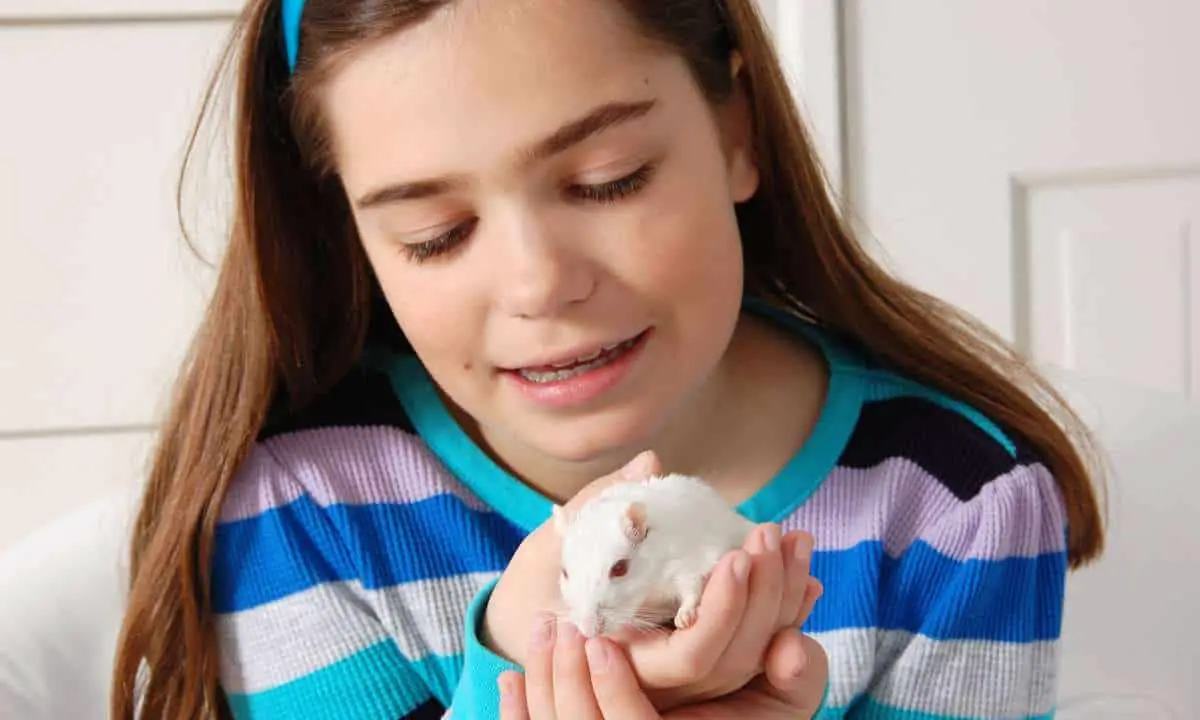Do Gerbils Like to Be Held? The short answer is yes, but there’s more to the story! Dive into this entertaining article to explore the ins and outs of gerbil affection, and discover how to make your tiny furry friend feel like a king or queen in your hands.
Table of Contents
Gerbils as Pets, Handling, and Caring
How to Get Your Gerbil to Like Being Held
To help your gerbil feel comfortable with being held, spend a lot of time getting used to your presence. Start by placing your hand in the tank and allowing your gerbil to explore your hand on its own terms.
As your gerbil becomes more familiar with your presence, you can gradually try to pick them up and hold them gently [3]. Remember to never squeeze or hug your gerbil, as they can easily be injured.
Do Gerbils Make Good Pets?
Gerbils make great pets, especially for kids, as they are small and easy to handle. They can be a good way for children to learn about responsibility and caring for a living creature.
However, it’s essential to consider if a gerbil is the right pet for the child, taking into account factors such as the child’s age, ability to handle the pet, and commitment to care for the gerbil.
Caring for Your Pet Gerbil
To keep your gerbil happy and healthy, provide them with a spacious enclosure, such as a gerbilarium, with plenty of bedding for them to burrow in.
Gerbils should be kept in pairs or groups, as they are social animals and can become lonely and unhappy when kept alone. Make sure to provide a running wheel for exercise, as well as toys and treats to help them stay stimulated and engaged.
In summary, gerbils can be affectionate pets that enjoy being held and petted, as long as you approach them with care and patience.
They make excellent pets for children, teaching them responsibility and empathy for living creatures. With proper care, your pet gerbil can become a beloved companion and bring joy to your home.

Holding Gerbils
Why Do Gerbils Like to Be Held?
Gerbils may not inherently like to be held, but they can become more comfortable and affectionate with their owners over time. Holding and interacting with gerbils helps them form bonds with their owners and can make them more relaxed and friendly.
Is It Safe to Hold Your Gerbils?
Yes, it is safe to hold your gerbils, but you should do so properly to ensure their safety and comfort. Adjust your hold based on your gerbil’s behavior and comfort level.
The Correct Way to Hold Your Gerbils
To hold a gerbil for the first time, let it explore and climb over your hands while keeping one hand in front of the other to prevent falls.
Hold your gerbil for about 30 seconds initially and gradually increase the duration as it becomes more comfortable. Adjust your hold as needed to ensure your gerbil’s safety and comfort.
Does Holding Your Gerbils Help You Bond?
Yes, holding and interacting with your gerbils can help you bond with them. Rewarding positive behavior during taming sessions can make your gerbil more comfortable around you and reinforce a positive connection.
How Often Should You Hold Your Gerbils?
Set aside a few minutes every day to interact with your gerbil to help build trust and establish a bond. Be patient and consistent in your interactions to help your gerbil become more comfortable with being held.
When Is the Best Time to Hold Your Gerbils?
There is no specific best time to hold your gerbils, but it is important to be consistent with daily interactions to build trust and familiarity.
Gerbils are most active during the early morning and late afternoon, so you may have more success handling them during those times. However, the key is to observe your gerbil’s behavior and preferences to determine the most suitable time for interaction.
Gerbil Affection and Interaction
Do Gerbils Like to Be Held, Cuddled, and Petted?
While gerbils may not inherently enjoy being held, cuddled, or petted, they can become more comfortable with these interactions as they develop bonds with their owners. It is essential to be patient and gentle when handling gerbils, as they may need time to adjust to these forms of affection.
Some gerbils may prefer more indirect forms of interaction, such as exploring their surroundings or playing with toys. It’s important to observe your gerbil’s behavior and body language to determine their preferences and create a positive environment for your small pet. Regular, gentle interactions can help build trust, making your gerbil more inclined to accept and even enjoy being held, cuddled, or petted over time.
Remember to approach your gerbil calmly, respect their space, and always handle them with care to ensure they feel secure and comfortable during these interactions.
Are Gerbils Affectionate?
Individual gerbils may display varying levels of affection due to factors such as their unique temperament, past experiences, or how they have been socialized with humans.
Similar to humans, each gerbil has its own personality, with some being naturally more affectionate, while others might be more reserved or timid.
Past experiences can play a significant role in a gerbil’s level of affection. Gerbils that have had positive interactions with humans from a young age are more likely to be comfortable with and receptive to affection.
In contrast, gerbils that have had negative or limited experiences with humans may require more time and effort to build trust and develop affectionate behaviors.
A gerbil’s socialization with humans can also greatly impact their level of affection. Gerbils that are regularly exposed to gentle handling and positive interactions with humans are more likely to develop trust and become affectionate towards their owners.
On the other hand, gerbils that have not been adequately socialized or have experienced harsh handling may be more fearful and less likely to display affectionate behaviors.
Why Are Some Gerbils More Affectionate?
Individual gerbils may exhibit varying levels of affection due to several factors, such as their unique temperament, past experiences, or the way they have been socialized with humans.
Just like humans, each gerbil has its personality, and some may naturally be more affectionate, while others may be more reserved or timid.
Their past experiences can also play a significant role in their level of affection. Gerbils that have had positive interactions with humans since a young age are more likely to be comfortable with and receptive to affection.
On the other hand, gerbils that have had negative or limited experiences with humans may require more time and effort to build trust and develop affectionate behaviors.
The way a gerbil has been socialized with humans can greatly impact their level of affection as well. Gerbils that are regularly exposed to gentle handling and positive interactions with humans are more likely to develop trust and become affectionate towards their owners.
Conversely, gerbils that have not been adequately socialized or have experienced harsh handling may be more fearful and less likely to display affectionate behaviors.
To foster trust and affection between you and your gerbil, it is crucial to engage in consistent, gentle interactions. Approach your gerbil calmly, and always handle them with care.
Over time, these positive experiences will help your gerbil feel more secure and comfortable around you, ultimately leading to a stronger bond and increased affection.
It is essential to be patient and understanding, as building trust and affection can take time, especially for gerbils with more reserved temperaments or those with negative past experiences.
Do Gerbils Like to Be Petted?
Gerbils may not inherently enjoy being petted, but they can become more comfortable with this form of interaction as they develop bonds with their owners. Be patient and gentle when petting your gerbil, and observe its behavior to ensure it is comfortable with this type of affection.
It’s essential to approach your gerbil calmly and pay attention to their body language, as this can help you determine if your gerbil is receptive to being petted. Keep in mind that each gerbil is unique, and some may prefer other forms of interaction, such as playing with toys or exploring their surroundings.
Regular, gentle handling and respecting your gerbil’s space can gradually build trust, making your small pet more open to being petted and showing affection over time.
Do Gerbils Like to Be Held?
Gerbils may not inherently like to be held, but they can become more comfortable with being held as they develop bonds with their owners. It is important to hold gerbils properly and patiently to help them adjust to this form of interaction.
Do Gerbils Like to Cuddle?
While gerbils may not inherently enjoy cuddling, they can become more comfortable with close contact and affection as they develop bonds with their owners.
Be patient and gentle when attempting to cuddle with your gerbil, and observe its behavior to ensure it is comfortable with this type of interaction.
Gerbil’s Attention and Happiness
How Much Attention Do Gerbils Need?
Gerbils are social animals and need regular interaction to stay happy and healthy. While there isn’t a specific amount of time you should dedicate to interacting with your gerbil, it’s essential to spend time with them daily. This can include handling, petting, feeding treats, and engaging in playtime.
How to Tell if Your Gerbil Likes Affection
A gerbil that likes affection will show signs of trust and feel secure around you. They may be more inclined to come to your hand, allow you to pet them, and show excitement about spending time with you.
Watch for positive body language, such as grooming sessions, which indicate that they feel safe and secure.
Can You Train Your Gerbil to Like You?
While you can’t necessarily train a gerbil to like you, you can build trust and a bond with your gerbil through consistent, gentle interactions. Over time, your gerbil may develop affection for you and enjoy spending time with you.
Be patient, and always approach your gerbil calmly to help them feel comfortable around you.
How to Make Your Gerbil Happy
To make your gerbil happy, provide a clean and stimulating environment by cleaning their cage regularly. Offer a variety of toys and activities to keep them entertained, such as tunnels, climbing structures, and chew toys.
Ensure they have a balanced diet, including fresh food in moderation [4]. Spend time with your gerbil daily, handling them gently, and engaging in playtime.
You can also teach your gerbil tricks using voice commands and hand gestures, which can provide mental stimulation and strengthen your bond.




